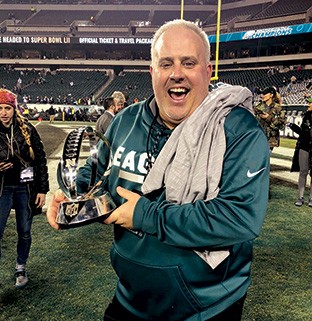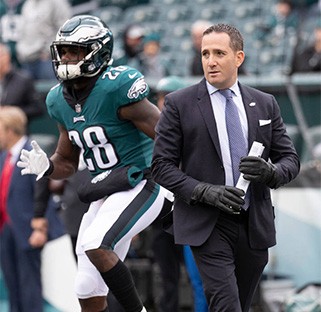- CFOs in a Time of Transformation
- Disruptive Strategy
- Featured
- IQ Insigniam Quarterly® Magazine
- Slideshow
Philadelphia Eagles’ CFO Is All About Winning
Professional sports teams may be for-profit organizations, but they are not like other businesses. For starters, winning is the sine qua non—the entire organization is oriented around victory. Frank Gumienny, senior vice president and CFO of the National Football League’s Philadelphia Eagles, has a pithy way of saying all this. When he gives a speech or interviews someone for a job, he calls the Eagles an “almost business.”
“Most businesses make decisions around the financial aspects,” he says. “We look at how we can run the business to help prepare the team to be the most successful on the field. Winning is our first priority.”
You could say that winning has been their strong suit recently. After claiming their first-ever Super Bowl championship in early 2018, the Eagles saw the team’s value rise more than $100 million to $2.8 billion, according to Forbes. Despite the Eagles raising prices for the 2018 season by $5 to $25 per ticket, more than 40,000 fans sit on the waiting list clamoring to get them.
With his stocky build and down-to-earth personality, Mr. Gumienny blends right in with Eagles fans. Having grown up in Northeast Philadelphia, he has always been one. He speaks with authenticity and authority when he says, “What we sell is passion and experience.”
As CFO, Mr. Gumienny plays a multidimensional role to create that passion and experience. Beyond the traditional finance and accounting domain, he is in charge of ticket sales, IT, guest services, merchandise and booking concert and auxiliary events at Lincoln Financial Field—the Eagles’ multipurpose stadium erected in 2003.
One day, he might find himself negotiating a deal for country singer Kenny Chesney to perform at the Linc (as locals call the stadium). The next, he might be across the river in New Jersey, visiting the farm that grows the sod for the football field.
“The CFO role has become more strategic,” Mr. Gumienny says. “In the past, the role of accounting was to record transactions. Now we’re party to decision-making ahead of time.”
Building Connections
It was not this way when Mr. Gumienny joined the Eagles two decades ago. After earning a bachelor’s degree in accounting, he worked for four years at PricewaterhouseCoopers. When a friend told him about an opening at the Eagles, he quickly updated his résumé. He was the first certified public accountant hired by the organization.
“The CFO role has become more strategic. In the past, the role of accounting was to record transactions. Now we’re party to decision-making ahead of time.”
—Frank Gumienny, CFO, Philadelphia Eagles
As a consummate team player, Mr. Gumienny often said “yes” when things needed to be done. That meant handling all sorts of tasks that did not involve ledgers or spreadsheets. He volunteered to drive the team van to the airport to pick up new players unfamiliar with the city. And he spent 10 years as a spotter for the team’s radio broadcast (see “On the Spot” sidebar below).
He steadily worked up the ranks, becoming director of finance in 2003 and then CFO in 2012. It was as director of finance that his role began to expand beyond bookkeeping. This was because the Eagles moved into the state-of-the-art Lincoln Financial Field the year he was promoted. The team had previously played in the city-owned Veterans Stadium for the past three decades.
“When we were a tenant at Veterans Stadium, we didn’t have to do much beyond collect ticket revenues,” Mr. Gumienny says. “We didn’t even have to maintain the field.” Risk management rarely came into play because there was not much risk to manage.
The Linc changed that. It has been a landmark football stadium in many ways. Considered one of the NFL’s greenest, the site has 14 wind turbines and 11,108 solar panels. On the Linc’s 10th anniversary, the stadium got a $125 million upgrade that included new high-definition video boards, two new connecting bridges for upper levels and enhanced Wi-Fi, allowing fans to check stats and highlights during the game. The upgrades were chosen based on research with season ticket holders, advisory boards and fan focus groups.
“As ticket prices rise, people want more for their money,” Mr. Gumienny says. “It’s important we build those connections so people feel part of the team.”
That they do. According to an annual survey of NFL fans conducted by professor Mike Lewis at Emory University’s Goizueta Business School, the Eagles rank in the league’s top five fan bases year after year for money spent on tickets and gear, and passion displayed on social media platforms—win or lose.
Mr. Lewis was surprised that the Eagles do so well in the survey considering they have not typically earned the national recognition of teams like the New England Patriots and Dallas Cowboys. “It’s a strong indicator that they have a very passionate fan base and suggests that management has done a good job of putting the fans first,” Mr. Lewis says.
More Than a Football Field
Part of Mr. Gumienny’s job is to fortify fan connections while maximizing use of the Eagles’ stadium. Opening up NFL stadiums on non-game days has been the biggest transformation in the sports industry in his 21 years working for the Eagles, he says. “People used to have the attitude that it is just a football stadium. Some teams are still old-school and won’t allow you to touch the field. We’re on the forefront of using the stadium in a more productive way.”
As CFO Mr. Gumienny frequently serves as the chief events coordinator. He has booked events including soccer matches and concerts featuring U2, Taylor Swift and other pop music stars. It falls to him to set up contracts with performers and manage risks that accompany non-football events. Mr. Gumienny calculates the upside and risk, determining if he wants to pay more upfront and take a higher percentage of the profits, or pay less upfront and allow the performers a bigger possible return.
Expanding the use of the Linc to bring in new kinds of revenue is only possible because of the organization’s “trust relationships,” he says. Mr. Gumienny can negotiate a concert for a Tuesday night because he has faith that Tony Leonard, the Eagles’ director of grounds, will get the field back in game shape by Sunday.
“Checking out a sod field and booking concerts might seem outside the purview of a CFO, but it all ties back to the same concept: helping the team win,” he says.
His efforts have not gone unnoticed. In his 2018 book Fearless: How an Underdog Becomes a Champion, Eagles head coach Doug Pederson calls out Mr. Gumienny for contributing to the team’s on-the-field success.
“The thing about sports is it provides very clear goals,” he says. “In other industries, different departments in a company might have different goals. But everyone here is an Eagle.” Share on X
“In other industries, different departments in a company might have different goals. But everyone here is an Eagle.”
—Frank Gumienny

 In June 2018, a few months after the Philadelphia Eagles won their first Super Bowl championship, the team’s executive vice president of football operations spoke at Insigniam’s annual executive summit. Howie Roseman has worked for the Eagles since 2000.
In June 2018, a few months after the Philadelphia Eagles won their first Super Bowl championship, the team’s executive vice president of football operations spoke at Insigniam’s annual executive summit. Howie Roseman has worked for the Eagles since 2000. 


